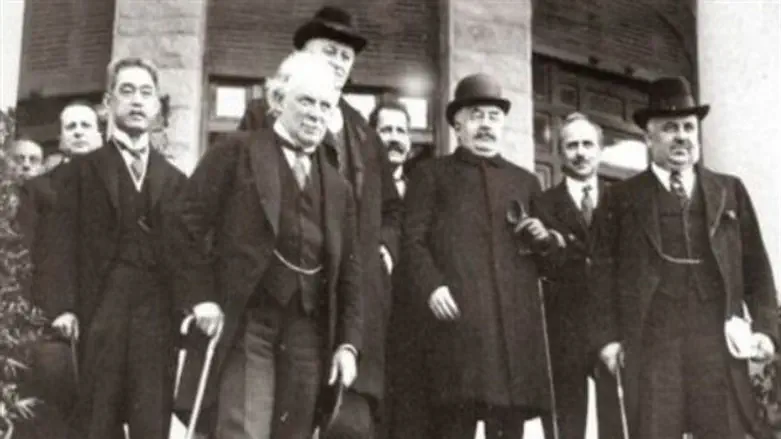
San Remo hosted world leaders to decide the future of Palestine, Syria and Mesopotamia in April 1920. The Ottoman Empire was no more and the four major World War I Allied Powers - Britain, France, Italy and Japan - met to divide the spoils.
Syria and Mesopotamia (Iraq) were to be given to the Hashemites. As far as the Jews were concerned, it codified the Jewish People's rights to the Land of Israel into international law according to the terms and policy of the Balfour Declaration, namely that “His Majesty’s Government view with favour the establishment in Palestine of a national home for the Jewish people,” and that Britain “will use their best endeavours to facilitate the achievement of this object.”
This event was celebrated in Jewish communities worldwide and treated as if it was a Jewish national holiday.
The Arabs, of course, objected. Feisal and Abdullah saw themselves as Hashemite rulers of the Middle East until the House of Saud engaged them in fierce battles during this time of history.
As is usual in the Arab world, both hated each other with a passtion, but were united against allowing Jews to gain any ascendency in the Middle East.
For them all, it was a stain on the Arab tradition of conquest to allow a non-Arab, non-Muslim, presence to take hold in the region.
The 400-year-old non-Arab Ottoman Empire had been accepted with silence by the impoverished local Arabs in the barren district of Palestine, but that was in deference to the Islamic rulers of Constantinople.
Not long after the San Remo Conference, Britain began to view their geopolitical interests in the Middle East differently.
The British realized, prompted by the Americans, that the Arabs had something valuable under their feet. Oil. This greasy liquid would be necessary for Britain’s motorized and industrialized future prosperity.

Had the British lived up to their word, the Holocaust might not have happened. The Suez Canal, built by the French in 1800, was also an asset for Britain. It acted as a vital trade artery to India.
The Suez Canal, built by the French in 1800, was also an asset for Britain. It acted as a vital trade artery to India.
Post San Remo the British became aware that they could ill-afford to upset the Arabs. If they did, their future self-interests would be gravely impaired.
The British went back on their obligations to the Jews. They lobbed off the area called Transjordan that was supposed to be part of the Jewish State iin the San Remo agreement and gave it to the Hashemites as well. They went as far as to close off pre-state Palestine to Jewish immigration during the critical and tragic period of World War Two, and continued to deny post war Jewish refugees access to the land.
The decisions of the San Remo Conference had international legal validity then and have legal validity today as the League of Nations adopted them, but legal truths and naitonal sel-interest did not match.
Had the British lived up to their word, the Holocaust might not have happened. Hitler, at first, wanted to expel Europe’s Jews, but no one was prepared to take them, and the British had effectively locked them out of what had been promised to be the National Home of the Jewish People.
Had these Jews been allowed to enter their future state, Israel today would have been celebrating the 73rd anniversary of a nation, not with nine million Jews, but a Jewish State with twenty million Jews.
That is the bitter-sweet legacy of Western cynical, immoral, confused, and deadly policies post San Remo.
Barry Shaw, Israel Institute for Strategic Studies.